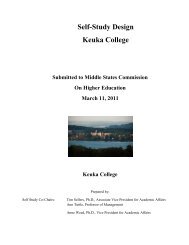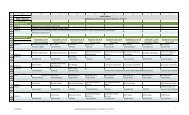final version of the self-study document - Keuka College's Middle ...
final version of the self-study document - Keuka College's Middle ...
final version of the self-study document - Keuka College's Middle ...
You also want an ePaper? Increase the reach of your titles
YUMPU automatically turns print PDFs into web optimized ePapers that Google loves.
identifying <strong>the</strong>ir anticipated learning objectives, a potential site and site supervisor, and how <strong>the</strong>y<br />
will assess achievement <strong>of</strong> <strong>the</strong>ir objectives. The academic advisor (faculty) typically signs on as<br />
<strong>the</strong> evaluator <strong>of</strong> <strong>the</strong> Field Period experience and reviews students’ journals, reflection-based<br />
summary papers, and unique <strong>document</strong>ation before assigning a grade <strong>of</strong> satisfactory or<br />
unsatisfactory (Appendix 6.33 FP Contract explanation and examples). The Field Period process<br />
is communicated and taught to all first year students through <strong>the</strong> FYE 101 course (Experiential<br />
Learning), <strong>the</strong>ir academic advisors, and <strong>the</strong> Field Period Resources Moodle site<br />
(http://courses.keuka.edu/course/view.php?id=289 and Appendix 6.34 Field Period Resources on<br />
Moodle). Transfer students in <strong>the</strong> traditional program do not take FYE 101. Instead, staff from<br />
<strong>the</strong> Center for Experiential Learning conduct a class/workshop, FP 201, Field Period<br />
Orientation, mandatory for transfer students, in fall and spring to familiarize <strong>the</strong>m with <strong>the</strong><br />
process and goals <strong>of</strong> experiential learning.<br />
Students in <strong>the</strong> Accelerated Studies for Adults Program (ASAP) meet <strong>the</strong> College’s requirements<br />
for experiential learning in a number <strong>of</strong> ways. Whereas <strong>the</strong> Nursing program requires its students<br />
to complete a 3-credit field period <strong>of</strong> 140 hours, typically employing a service-learning approach<br />
(2012-2013 ASAP Undergraduate Handbook, 71), <strong>the</strong> Organizational Management and Criminal<br />
Justice programs require students to complete an action-research project preferably at <strong>the</strong>ir<br />
places <strong>of</strong> employment, providing <strong>the</strong>m “a platform for application <strong>of</strong> knowledge and skills<br />
acquired within an organization’s changing environment” (ASAP Undergraduate Handbook, 53).<br />
Students in <strong>the</strong> Social Work program participate in a senior-level 15-credit learning experience<br />
which spans a period <strong>of</strong> nine months, for a minimum <strong>of</strong> 416 hours <strong>of</strong> practicum experience at <strong>the</strong><br />
practicum site. Academic advisors serve as mentors to students throughout <strong>the</strong> experiential<br />
learning experience, and grades are awarded upon <strong>the</strong> successful completion <strong>of</strong> <strong>the</strong> experience or<br />
action research project.<br />
Experiential learning is important in our overseas programs as well. In <strong>the</strong> China programs, Field<br />
Period is conducted and spread out in four years <strong>of</strong> <strong>the</strong> <strong>Keuka</strong> China Programs. As described in<br />
<strong>the</strong> <strong>Keuka</strong> China Program Student Handbook, Field Period “provides opportunities for<br />
awareness <strong>of</strong> social responsibility, cultural literacy, personal growth, and career possibilities.<br />
Each student initiates and designs her or his learning experience in consultation with a faculty<br />
advisor at <strong>the</strong> partner university. The faculty advisor helps <strong>the</strong> student prepare for and reflect on<br />
<strong>the</strong> experience and evaluates <strong>the</strong> learning accomplished.” A 2010 review <strong>of</strong> 88 randomly chosen<br />
FP supervisors’ evaluations provides evidence <strong>of</strong> <strong>the</strong> value <strong>of</strong> Field Period to <strong>Keuka</strong>’s Chinese<br />
students and potential employers, with students scoring highly across <strong>the</strong> measure <strong>of</strong> personal<br />
responsibility and ability to “grasp new situations readily” (Appendix 6.35 China Field Period<br />
Survey 2010). In Vietnam, <strong>the</strong> students are required to complete <strong>the</strong> FP401, a course designed to<br />
provide students in <strong>the</strong> Vietnam program supervised applied learning experiences. Students plan,<br />
implement, manage and evaluate four major events during this intensive experiential learning<br />
course. This course is designed to have an instructor who provides oversight, guidance and<br />
evaluation <strong>of</strong> student performance and participation. This course addresses <strong>the</strong> concerns <strong>of</strong> how<br />
<strong>Keuka</strong> College can track experiential learning in an international setting. The FP401 course has<br />
been successfully delivered in Hanoi twice (Summer <strong>of</strong> 2011 and Summer <strong>of</strong> 2012). Students in<br />
Ho Chi Minh City are still within <strong>the</strong>ir freshmen or sophomore years, and <strong>the</strong>refore have not yet<br />
taken this senior level course.<br />
Page 35 <strong>of</strong> 39 Chapter 6: Faculty, Ed Offerings & GenEd




